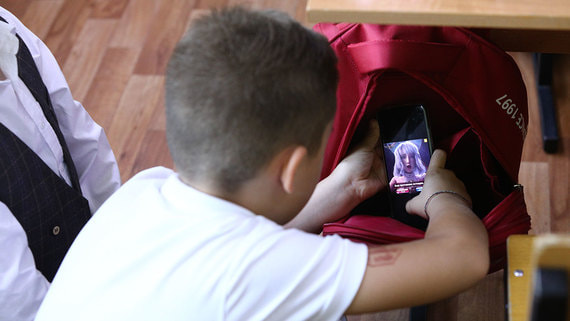A bill banning the use of phones during lessons was introduced to the State Duma
[ad_1]

State Duma deputies and senators proposed banning the use of telephones in schools without the permission of the teacher. The authors want to add a new paragraph to Art. 43 of the Law “On Education”, which talks about the duties and responsibilities of students. Schoolchildren will be able to use communication devices during lessons only for educational purposes and in emergency cases.
The bill also proposes to introduce disciplinary sanctions against students who violate the internal regulations of the educational institution. Penalties are planned to be applied to students who “violate or infringe” the rights of a teacher. In accordance with current legislation, disciplinary sanctions at school are reprimand, reprimand and expulsion.
The initiative also strengthens “the dominant role of the teacher in the process of training and education in an educational organization.” The amendments will help eliminate “disproportions between the legal status of a teacher and other participants in the educational process in terms of respect for human dignity and the prevention of the use of physical and mental violence,” the explanatory note says.
Minister of Education Sergei Kravtsov explained to reporters that “we are not talking about any prohibitions.” The student will always be in touch with his parents, but in the educational process, mobile devices should be used only with the permission of the teacher: “It is the teacher who builds the educational process in the lesson, he is the main person in the class, and the quality of education directly depends on the involvement of the children and their adherence to discipline.”
In April 2022, the Ministry of Education already recommended that schools collect phones from students before entering the classroom. Kravtsov also advised using phones only with the permission of the teacher as part of the educational process. In August of the same year, recommendations for gadgets were included in the new sanitary rules of Rospotrebnadzor: students were prohibited from using phones during class instead of a tablet or computer due to the small size of the screen. The Ministry of Education then explained that this provokes poor posture and strain on the visual organs.
One of the authors of the bill, the first deputy chairman of the education committee, Yana Lantratova (A Just Russia – For Truth), told Vedomosti that the initiative will allow students not to be distracted themselves and not interfere with other children gaining knowledge. “And teachers themselves admit that sometimes they are simply afraid to go to class, complaining that they are sometimes in a vulnerable position and are in no way protected from digital threats,” she noted. According to the deputy, there are cases when schoolchildren turn on the phone, shoot a video, insulting the teacher, provoking him to react, bringing him to tears and heart problems.
The document will be considered at round tables in the State Duma, the Public Chamber and at meetings of deputies with voters, added another author of the initiative, Deputy Speaker of the Lower House Boris Chernyshov (LDPR).
Another author of the bill, the leader of the New People party, Alexey Nechaev, reminded Vedomosti that in early October, 72% of parents supported the ban on smartphones in schools. After public debate began, this percentage increased to 83%, according to SuperJob research. Nechaev emphasized that there is a direct connection between the use of phones and the quality of education: every year children’s ability to concentrate decreases. “Even the most talented teacher can hold a child’s attention for 10–15 minutes maximum. Now he receives notifications on his smartphone every couple of minutes. It’s very difficult to concentrate,” he said.
Evgeny Zheglov, deputy director of the New Look school for primary and high school, considers the restriction to be the right initiative, which will enable the school, together with the parent community, to independently determine the policy for the use of gadgets. “This policy depends on the educational model of the school, the readiness of the academic team to effectively use gadgets in the educational process and the technologies with which a particular school works,” he added.
The restrictions specified in the document look quite correct, says the head of the Center for General and Additional Education. A. A. Pinsky Sergei Kosaretsky. According to him, there is indeed an increase in the number of conflict situations around the use of gadgets, and teachers and schools do not have enough tools to resolve them. “The emphasis is on protecting the interests of teachers and strengthening their ability to regulate children’s behavior, which seems to me to be true in the current situation.
It is clear that the legislator also seeks to improve his image in the eyes of the professional community,” added Kosaretsky. At the same time, the expert believes that the competent use of smartphones and other gadgets in education using artificial intelligence technologies can increase the effectiveness of learning.
[ad_2]
Source link








